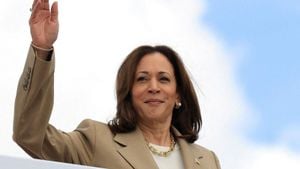With Donald Trump officially re-elected as President of the United States, the economic and political ramifications of his return are already being felt both domestically and worldwide. Political analysts and economic experts are closely examining what this means, especially as several key players on the global stage, particularly in the Asia-Pacific region, have experienced their own leadership changes.
Following Trump’s victory, leaders across Asia, including Japan and South Korea, are evaluating their strategies as they brace for the new U.S. administration. Trump's first term saw significant shifts in diplomatic relationships and trade policies, and the second term seems poised to continue this trend. For Japan, Prime Minister Shigeru Ishiba has echoed apprehensions about potential trade wars and military pressure if Trump's aggressive America First strategy reassembles.
This political dynamic is reminiscent of past diplomatic confrontations, as concerns rise about the balance of power shifting under Trump's leadership. Ishiba has already reached out to Trump, emphasizing the necessity for establishing personal connections between their administrations, which mirrors the strategic ties formed during Trump's first presidency.
Economically, Trump's return has sparked discussions around residential and commercial real estate dynamics within the U.S. A report indicates his administration’s policies are expected to shape the U.S. commercial real estate (CRE) market through potential tax cuts and immigration regulations which could impact labor availability and costs. Specifically, the curtailment of immigration is expected to inflate operational costs across various sectors, particularly hospitality and construction.
This sentiment is reflected through the lens of U.S. markets, traditionally volatile during Republican-led administrations. Economists are predicting higher risks coupled with deregulation may fuel IPO activity. The U.S. witnessed record-breaking IPOs during Trump’s last term, and many foresee a resurgence now, particularly as tech firms like Klarna pivot their listings away from the London Stock Exchange toward American markets.
Much of this transition stems from the aggressive policies Trump promoted, particularly deregulation and corporate tax cuts, which entice companies to seek U.S. listings. There’s concern, though, about overinflated valuations and instability, as little checks exist to moderate rapid economic changes.
Trump’s expansive wealth and his numerous business interests pose unique ethical challenges, as critics speculate whether Trump can separate his responsibilities as president from his personal investments effectively. During his initial term, Trump was criticized for not sufficiently divesting from his diverse real estate portfolio, which stretches from luxury condos to resorts worldwide.
The potential conflicts of interest could influence policy decisions, especially if Trump's business dealings benefit from choices made during his presidency. Faced with intense scrutiny, Trump’s approach involves appointing individuals whose business backgrounds suggest they understand the nuances of operating within his economic framework.
Appointees for Trump’s new cabinet, including hedge fund managers and investment moguls, are subject to strict federal ethics laws, requiring them to disclose their financial holdings. Yet, unlike conventional standards expected of such officials, Trump has long preferred to keep his financial empire intact, potentially leading to calls for transparency and accountability during his second term.
From the negotiation table to legislation drafting, Trump’s administration will confront challenging ethical waters, especially when appointing individuals with substantial private interests. Many federal positions, from the Treasury to Commerce, will draw public interest — how these leaders navigate their own investment stakes alongside their public duties will be under close observation.
Looking outward, observers can expect ripple effects on global markets. Trump’s inclination toward tariffs raises flags, particularly among international trade partners. Analysts are predicting UK businesses might pivot due to the changes the new administration is expected to usher, for instances, by relocating operations to the U.S. to avoid potential fallout from tariffs.
Experts point to the necessity for UK regulators to respond strategically if they wish to maintain competitiveness as firms weigh decisions to cross the Atlantic for IPO endeavors. Without favorable terms or regulatory frameworks, the allure of the U.S. markets will become hard to resist, particularly amid expected easing of compliance costs under Trump.
Overall, the next couple of months will be decisive for not only Trump’s presidency but how his economic strategies will manipulate the global stage. The convergence of domestic opinion, global reactions, and ambiguous ethical challenges will define the dialogue surrounding this administration.



